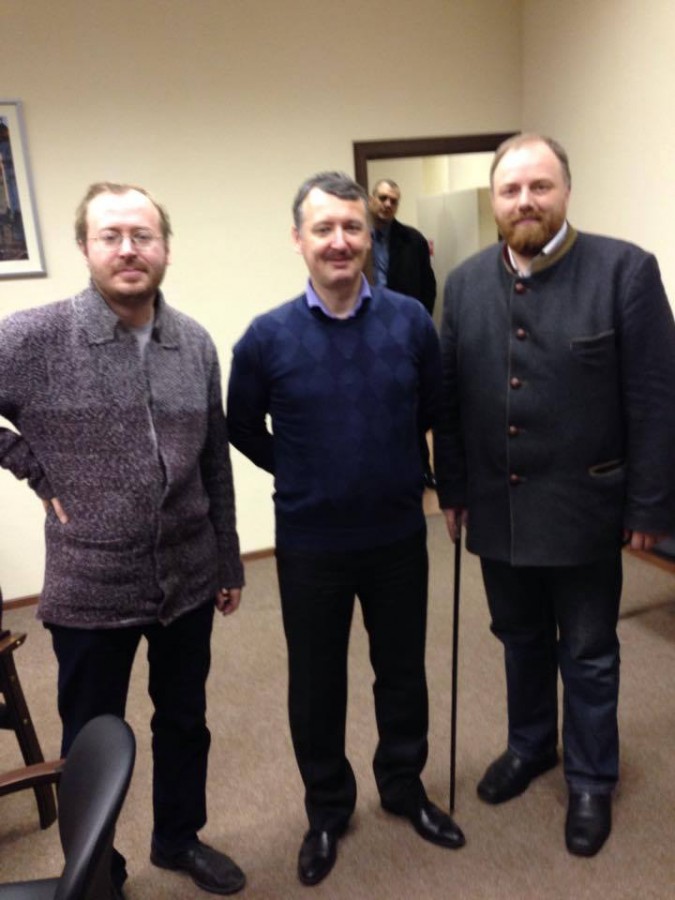Regarding the video with a castration of a Ukrainian POW, comments from the Russian ДШРГ Русич may give some context to the story:
"I have seen up to ten such clips. They're usually published 1-2 years after the events though to make perpetrators more difficult to identify"

"I have seen up to ten such clips. They're usually published 1-2 years after the events though to make perpetrators more difficult to identify"


Русич (Rusich) is a Russian Neonazi group fighting in Ukraine. They're reportedly closely associated with the Wagner mercenary company 

A Rusich fighter who told he had seen "up to ten such clips" is Evgeny Rasskazov (Topaz). Here you see his post commemorating Hitler's birthday:
"Today is birthday of out comrade who became example for many of us... his Word and Deed inspires us to beat the Ukro-Bolshevik scum"
"Today is birthday of out comrade who became example for many of us... his Word and Deed inspires us to beat the Ukro-Bolshevik scum"

That's Topaz with Egor Prosvirnin, the editor of *the* most important Russian nationalist media Sputnik and Pogrom which played an important role in setting the ideology of this war. When Putin made his speech, ppl described it as "Putin repeating Prosvirnin's talking points" 

Weirdly enough, Western media make very, very few mentions of the main Russian nationalist media, Sputnik and Pogrom when discussing this war. That leads to either intentional or unintentional massive representation of the Russian internal debates. Which led to what we have now 

The cultural influence of Sputnik and Pogrom (Спутник и Погром) in Russia is massive. It's so noticeable that the careful omission of them in almost any debate on this war looks almost intentional. Why would they avoid talking about them so carefully?
sputnikipogrom.com
sputnikipogrom.com

Because Prosvirnin was an integral part of the Moscow political and media establishment. Once you bring him and the Sputnik and Pogrom up, too many important people get associated. Here you see Prosvirnin hugging Ksenia Sobchak and political scientist Stanislav Belkovsky 

Random photos with other media personalities. Nationalist leader Belov, internet guru Nosik, writer Akunin. Regarding the first two, they might share lots of common agenda, I doubt about the third guy. I post this photos to show associations and a level of his connections 





Few key media personalities of the "Russian spring". They are little known in the West but very well - in Russia. Some commenters from Russia may deny it, but they 100% heard about them. Prosvirnin, Olshansky, Kholmogorov. They all stand for the war and escalation of violence 



I follow pro-war media personalities with great interest, because they're very talkative. For example, in an interview with a Ukrainian journalist Gordon Khodorkovsky @mbk_center wept on camera very persuasively, begging forgiveness. Forgiveness for what?
Perhaps Russian nationalist Kholmogorov may shed some light
Feb 28, 2022
"... we both know you're not pro-Ukrainian. We discussed this in Brussels long after the Crimea. We have no big disagreements except for your conviction that it's you and not Putin who should be in charge"
Feb 28, 2022
"... we both know you're not pro-Ukrainian. We discussed this in Brussels long after the Crimea. We have no big disagreements except for your conviction that it's you and not Putin who should be in charge"

Any comments from @mbk_center on that would be helpful. Kholmogorov's testimony seems to fit well to what we know about Khodorkovsky. In his interview to @albats he openly proclaimed himself a nationalist. But then she *deleted* this statement from the printed version. Why? 

My answer: Moscow media establishment like @albats is systematically whitewashing the figures like @mbk_center or @navalny . She knows that much of what they say isn't gonna be accepted well in the West. So she cuts it out or as I'll show later helps them to avoid responsibility 

The theme of Sputnik and Pogrom is avoided so carefully, because once it's brought up, one may wonder in which way Moscow "liberal" opposition is different from Kremlin and how was their positive image constructed. I'll cover it in next material on the Russian liberals. The end 

• • •
Missing some Tweet in this thread? You can try to
force a refresh





